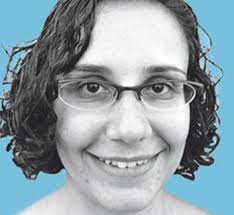Last year at this time, we were hearing the distressing news of the conflict in Gaza. Coinciding with Tisha B’av, which this year occurs in the week to come, Jews everywhere were mourning, and beginning to argue with aching hearts about Israel, and about justice.
Parashat Devarim begins with Moses addressing “all Israel.” Rashi suggests this is so all of the community knows what has been spoken and is included. No one should be exempt or set apart because the community is responsible for ensuring that everyone follows the same rules — everyone is responsible for everyone. I am a rabbi in the Humanistic Jewish movement, and we believe strongly in the power of self-responsibility and actualization, but also the value of community. We need to take ownership of our own behaviour, but are we also responsible for the behaviour of our fellow Jews? Not all of them, not literally. However, our behaviour as Jews does reflect upon one another, even when we disagree. And we often do.
I, like many others, feel proud when I see Jews standing up for just causes. I feel they are somehow representing me and what I perceive to be the most important Jewish values – tzedakah and tikkun olam. Yet, I am embarrassed when Jews speak as Jews, often speaking as though on behalf of all Jews, when they advocate for policies and governments that are harmful. When Shmuley Boteach speaks as “America’s rabbi” against the Palestinians, or when Benjamin Netanyahu says he speaks for all Jews and then uses anti-Palestinian rhetoric as a tool for re-election, I cringe. When rabbis and community leaders claim halachic authority or appeal to “tradition” to speak against rights for women and for LGBTQ people, I scowl. The challenge is that when I speak out for justice, it is as a Jew as well as a concerned human being in the world. But I do not and cannot speak for everyone.
Last year, I was sometimes proud and sometimes horrified at how members of my Jewish community spoke about Israel, about Palestine, and about the ongoing conflict. There were moments when I heard other Jews – colleagues and friends even – calling for or justifying terrible violence. When the Jewish voice sounds hateful, it is hard to understand how we can conceptualize ourselves as one people, one voice. But we hold the dream of Am Israel in our hearts. We value the concepts of nationhood and peoplehood, even as we struggle with them.
Tisha B’av gives us the chance to speak about destruction and rebuilding. What we have lost, but also – crucially – how we have evolved. The Talmud tells us (Yoma 9b) that the Second Temple was destroyed because Sin’at Chinam (groundless hatred) was endemic to our people. We have both perpetrated hatred amongst one another and towards other cultures, and we have certainly been the recipients of groundless hatred throughout the ages. It is always my hope that Jews, having experienced the terrible effects of anti-Semitism, will stand up for other marginalized groups. I grew up in a South African Jewish community, and I was always perplexed when Jews could support racist apartheid practices and rhetoric as though their own experiences had taught them nothing. Groundless hatred has harmed us, yet we sometimes hate and harm as well. Some Jews feel the pain of the past, the many calamities inflicted on Jews for which we mourn, and they resort to feelings of vengeance and violence. They become the purveyors of baseless hatred. On Tisha B’av, we need to reflect on the prejudices we carry within us, and we need to concern ourselves with the losses of our own people and the losses of others. We need to take the lessons of Jewish history and apply them to our present day – where is there hatred and how can we stop it? Where is there destruction and how can we foster creation?
We are all entitled to our own independent views. But what Jews say to the broader public reflects on other Jews, and so it is important to be thoughtful about how we represent Judaism and its values. Although we can understand how the wounds of anti-Semitism can lead to a wish for retribution, we must not succumb to the politics of hate. We redeem ourselves and one another when we offer each other mirrors and models of ethical, just, and loving behaviour. We have a responsibility, like the Jews at Sinai, to watch out for each other. “All Israel” needed to be present for the guidelines of how to live as a people in its own land. We should seek that kind of presence for and with one another, even when we disagree.
Denise Handlarski is a rabbi at the Oraynu Congregation for Humanistic Judaism in Toronto, Canada.

